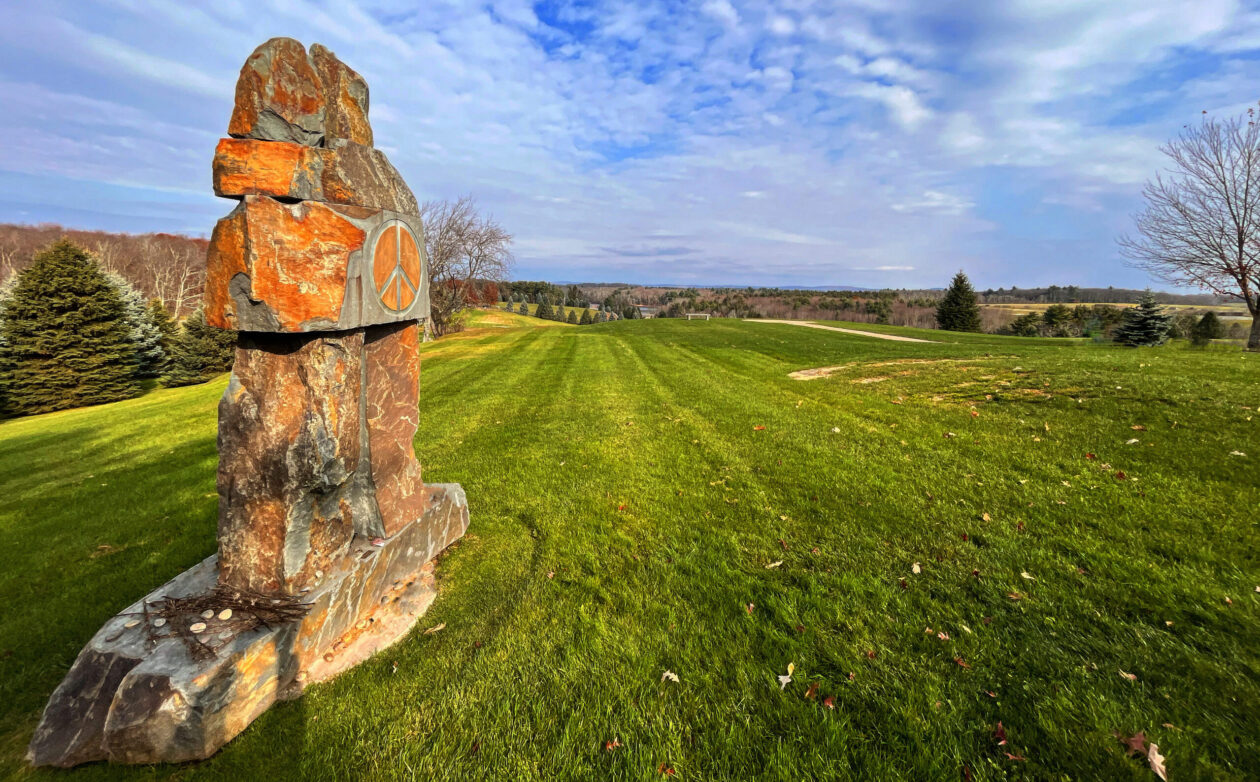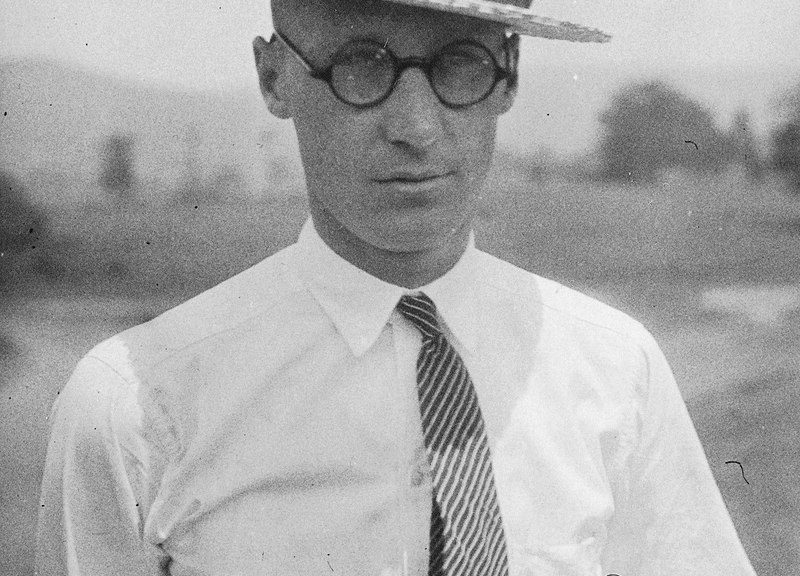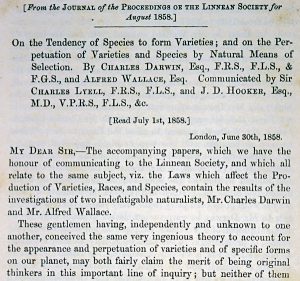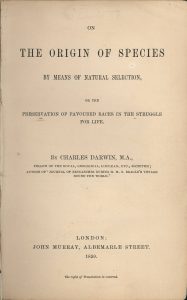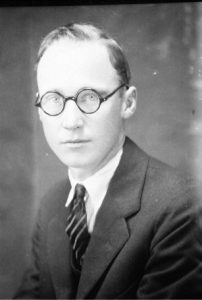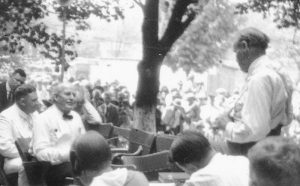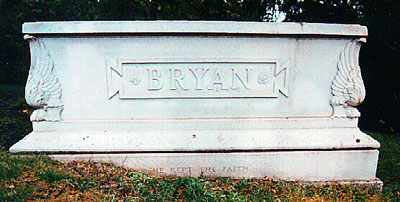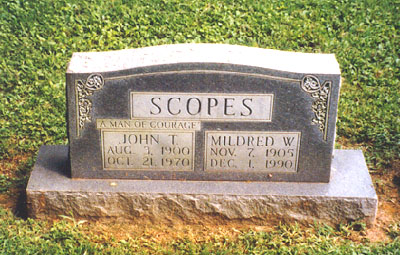John Scopes Monkey Trial
John Scopes, August 3, 1900 – October 21, 1970
“Evolution Mama” from Even Dozen Jug Band
Theory of Evolution
Charles Darwin is more widely known than Alfred Russell Wallace, but both men’s observations led them to independently propose the theory of evolution through natural selection.
Wallace had published his paper (with some of Darwin’s writings) in 1858. It was called, “On the Tendency of Species to form Varieties; and on the Perpetuation of Varieties and Species by Natural Means of Selection.”
The following year, Darwin published On the Origin of Species by Means of Natural Selection, or the Preservation of Favoured Races in the Struggle for Life) or more commonly and simply known as On the Origin of Species.
And while both men are credited with the theory of evolution, they themselves had built on others’ empirical observation.
John Scopes Monkey Trial
Butler Act
In certain parts of the United States, the ideas of natural selection and evolution became antithetical to those who believed that the world as they knew it had always been that way from the beginning. And the beginning, for those who believers in the literal interpretation of the Bible, was relatively brief moments (“one week”) when God began the world.
Tennessee was one of those places and on March 13, 1925, the state enacted the Butler Act names after John Washington Butler, the State Representative who had introduced it two months earlier.
The Butler Act stated: AN ACT prohibiting the teaching of the Evolution Theory in all the Universities, and all other public schools of Tennessee, which are supported in whole or in part by the public school funds of the State, and to provide penalties for the violations thereof.
The Act did not make it illegal to teach evolution regarding other animals, only humans, though John Butler’s intent was to keep the idea completely out of Tennessee’s academic institutions and to strictly adhere to the Bible’s story.
John Scopes Monkey Trial
John Thomas Scopes
John T Scopes was born on August 3, 1900. Darwin had died just 18 years earlier; Wallace was still alive and would be so for another 13 years.
After he a degree from the University of Kentucky in 1924, with a major in law and a minor in geology, he moved to Dayton, Tennessee where he took a job as the Rhea County High School’s football coach and occasionally filled in as a substitute teacher when regular members of the staff were off work.
After the enactment of the Butler Act, the American Civil Liberties Union responded immediately with an offer to defend any teacher prosecuted under the law. John Scopes, who had covered evolution in a science class, agreed to stand as defendant in a test case to challenge the law.
He was arrested on May 7, 1925, and charged with teaching the theory of evolution. Three days later, Scopes was given a preliminary hearing before three judges and 15 days later, he was indicted by a grand jury for violating Tennessee’s anti-evolution law.
John Scopes Monkey Trial
Darrow v Bryan
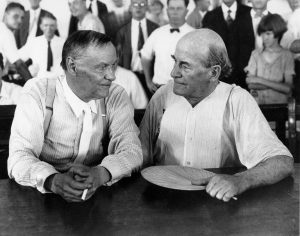
The well-known and oft unsuccessful Presidential candidate William Jennings Bryan was the lawyer for the prosecution. When the law had passed, Bryan had said, to Tennessee Governor Austin Peay, “The Christian parents of the state owe you a debt of gratitude for saving their children from the poisonous influence of an unproven hypothesis.”
Bryan chastised evolution for teaching children that humans were but one of (precisely) 35,000 types of mammals and bemoaned the notion that human beings were descended “Not even from American monkeys, but from old world monkeys”
Clarence Darrow represented Scopes.
The trial was followed on radio transmissions throughout the United States.
John Scopes Monkey Trial
Trial begins
July 10, 1925: the trial began with jury selection. Judge John Raulston asks the Rev. Lemuel M. Cartright to open the proceedings with a prayer.
John Scopes Monkey Trial
Clarence Darrow
July 13, 1935: in an effort to have the Butler law declared unconstitutional, defense attorney Clarence Darrow delivered a long, fiery speech arguing that the law violates freedom of religion. Darrow argued that “we find today as brazen and as bold an attempt to destroy learning as was ever made in the Middle Ages.”
John Scopes Monkey Trial
Opening with prayer
July 14, 1925: the third day of the trial, Darrow objected to the practice of opening the trial with a prayer. Judge Raulston overruled the objection, noting that he has instructed the ministers who offer the prayer to “make no reference to the issues involved in this case.”
John Scopes Monkey Trial
Law not unconstitutional
July 15, 1925: Judge Raulston overruled the defense’s motion to have the Butler law declared unconstitutional. Raulston says in his ruling that the law “gives no preference to any particular religion or mode of worship. Our public schools are not maintained as places of worship, but, on the contrary, were designed, instituted, and are maintained for the purpose of mental and moral development and discipline.”
In an afternoon session that day, a not guilty plea is entered on Scopes’ behalf. Each side presents its opening statements. The prosecution questioned the superintendent of schools and two of Scopes’ students, who testified that Scopes taught his class about evolution. The defense questioned zoologist Maynard Metcalf, who testified that evolution was a widely embraced theory in the scientific community.
John Scopes Monkey Trial
Bar expert testimony
July 17, 1925: Judge Raulston ruled in favor of a motion by prosecutors to bar expert testimony by scientists. Raulston argued that the experts’ opinions on evolutionary theory would “shed no light” on the issue at hand in the trial — whether Scopes violated the state’s anti-evolution laws. Many reporters leave town, believing that the trial is effectively over. Scopes was recruited to write news stories on the trial for some of the delinquent journalists.
John Scopes Monkey Trial
Heat moves trial outdoors
July 20, 1925: with the proceedings taking place outdoors due to the heat, the defense — in a highly unusual move — calls Bryan to testify as a biblical expert. Clarence Darrow asks Bryan a series of questions about whether the Bible should be interpreted literally. As the questioning continued, Bryan accused Darrow of making a “slur at the Bible,” while Darrow mocks Bryan for “fool ideas that no intelligent Christian on earth believes.”
John Scopes Monkey Trial
Guilty
July 21, 1925: the final day of the trial opened with Judge Raulston’s ruling that Darrow could not call Bryan back to the stand and that Bryan’s testimony should be expunged from the record. Raulston declared that Bryan’s testimony “can shed no light upon any issues that will be pending before the higher courts.”
Darrow then asked the court to bring in the jury and find Scopes guilty — a move that would allow a higher court to consider an appeal. The jury returned its guilty verdict after nine minutes of deliberation. Scopes was fined $100, which both Bryan and the ACLU offer to pay for him.
After the verdict was read, John Scopes delivered his only statement of the trial, declaring his intent “to oppose this law in any way I can. Any other action would be in violation of my ideal of academic freedom — that is, to teach the truth as guaranteed in our constitution, of personal and religious freedom.”
John Scopes Monkey Trial
Bryan dies
July 26, 1925: five days after the Scopes trial ends, Bryan died in his sleep in Dayton and on July 31 he was buried in Arlington National Cemetery. The words “He Kept the Faith” are inscribed on his tombstone.
John Scopes Monkey Trial
Appeal
January 15, 1927: the Tennessee Supreme Court ruled that the Butler law was constitutional. However, it overturned Scopes’ verdict on a technicality, ruling that his fine should have been set by the jury hearing the case instead of by Judge Raulston. The justices declared in their ruling that “[n]othing is to be gained by prolonging the life of this bizarre case.”
John Scopes Monkey Trial
The end…sort of
May 17, 1967, more than 40 years later, Tennessee Governor Buford Ellington signed into law the repeal of the Butler Act
John Scopes Monkey Trial
John Scopes after trial
Scopes accepted a scholarship for graduate study in geology at the University of Chicago. Later he worked for Gulf Oil in Venezuela where he met and married his wife, Mildred.
In 1930, he returned to the University of Chicago for a third year of graduate study. In 1932 he took a position as a geologist with the United Gas Corporation, for which he studied oil reserves. He worked, in Houston, Texas then in Shreveport, Louisiana, until he retired in 1963.
He died on October 21, 1970, of cancer in Shreveport, Louisiana at the age of 70.
John Scopes Monkey Trial
Legacies
Other state have since enacted laws that while not exactly copying the Butler Act, exactly copied its intent. These laws have met with resistance and typically failure after a court challenge.
Here are some examples:
Arkansas
November 12, 1968: the NY Times reported: “John Scopes hailed today the Supreme Court’s striking down Arkansas’s anti-evolution law.”
Tennessee, again
September 11, 1974 the NY Times reported: Tennessee’s 1973 “Genesis law,” which rekindled memories of the John. Scopes monkey trial, has been held unconstitutional.
The. Tennessee Legislattire passed the law in 1973; specifying that all biology textbooks in the state’s public chools must give equal consideration to all theories of creation of man.
Nashville Chancellor Ben Cantrel ruled Yesterday that the law is an act “respectting the establishment Of religion” and thus runs counter to constititional doctrine of separation of state and Church. The Nashville Chancellery Court rules on all civi challenges to state laws.
The law decreed that the Adam and Eve theory of man’s origin be described in text books aongside the theory Of evolution.
Ohio
On February 15, 2006, the NY Times reported: The Ohio Board of Education voted 11 to 4…to toss out a mandate that 10th-grade biology classes include critical analysis of evolution and an accompanying model lesson plan, dealing the intelligent design movement its second serious defeat in two months.
And Tennessee yet again
On April 15, 2012, the NY Times reported: Eighty-seven years after Tennessee was nationally embarrassed for criminally prosecuting the teaching of evolution, the state government is at it again. This time it has enacted a law that protects teachers who invite students to challenge the science underlying evolution and climate change. The measure is a transparent invitation to indulge pseudoscience in the classroom and a transparent pandering to a vocal, conservative fringe.
Louisiana
On November 19, 2017, the NY Times reported, Darwinism has long been under siege in parts of the United States, even if its critics have practiced their own form of evolution, adapting their arguments to accommodate altered legal circumstances. This installment of Retro Report shows the enduring strength of the forces that embrace the biblical account of Creation or reasonable facsimiles of it. For some of them, the rejection of broad scientific consensus extends to issues like climate change and stem-cell research. And the beat goes on.
